Welcome to Theros! Mythic Odysseys of Theros is the latest Dungeons and Dragons sourcebook, and it’s available now on D&D Beyond. Due to COVID-19, the book’s physical release has been delayed until July 21st, but you can get it digitally right now in the D&D Beyond Marketplace. Inspired by Greek mythology, Theros is a setting originally created for Magic: The Gathering, now beautifully realized as a setting for D&D adventures. Theros is filled with petty and powerful gods whose whims affect mortals on a daily basis, mythic monsters more powerful and terrifying than any the worlds of D&D have seen, and divine gifts that mark your characters as heroes destined for greatness. Yet for all these epic qualities, Theros is also a world filled with quieter moments of love, storytelling, and community. The three poleis of Theros are hubs of culture and philosophy, and are perfect places for heroes to have quieter adventures in-between adventures of mythic proportions.
Read on to learn what you’ll find in Mythic Odysseys of Theros, and decide for yourself if this brand-new D&D sourcebook is something you want to share with your gaming group. Remember: if your Dungeon Master has a Master Tier subscription, every source that anyone in the group owns can be shared throughout the entire group!
Chapter 1: Character Creation
Mythic Odysseys of Theros begins with a bang by giving you and your players a slew of new character-creation options, as well as lore that helps players understand their characters’ place in the world of Theros. Of course, there are brand-new races for you to choose, including the leonin, the lion-like race of Magic: The Gathering fan-favorite Ajani Goldmane, and the satyrs, who feel perfectly at home in a world inspired by Greek mythology. Other races in this book are centaurs and minotaurs which first appeared in Guildmaster’s Guide to Ravnica, and the tritons, whose lore in Theros is quite different than that presented in Volo’s Guide to Monsters.
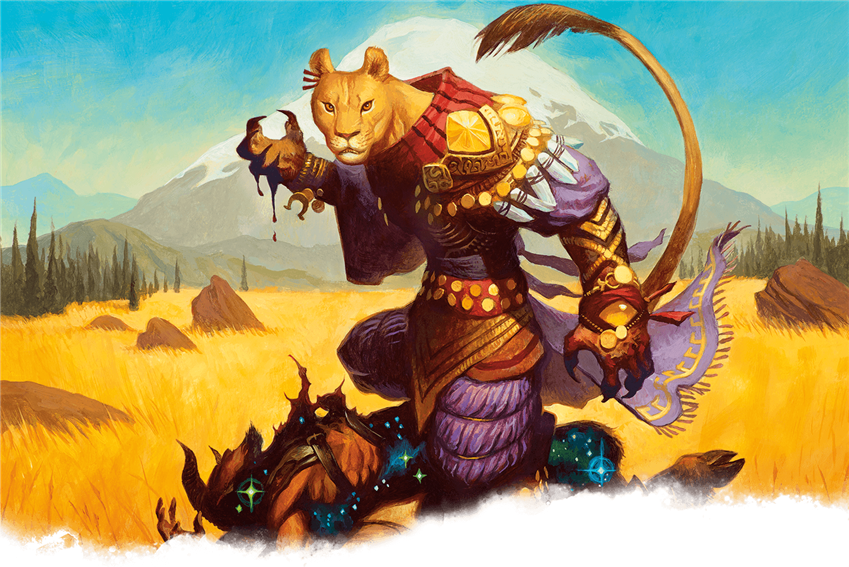
You may have seen the two new subclasses in this book available as playtest content on D&D Beyond last year. Now, the bardic College of Eloquence and the paladin Oath of Glory (previously Oath of Heroism) are now official character options! The College of Eloquence is perfect for bards who inspire friends and fracture their enemies’ resolve through oration and rhetoric. The Oath of Glory is suited for paladins that seek fame through heroism, imbuing them with peerless personal strength and the ability to inspire their allies with their heroic deeds.
Most exciting, however, are the Supernatural Gifts: fragments of divine power that set your character apart—perhaps from birth, if you are the child of a god, or perhaps because you accepted divine power from a god in order to complete a great quest. These gifts are broad in scope, ranging from the gaining a Heroic Destiny that gives you a story goal and provides game mechanics that make you a death-defying hero, to making you Nyxborn, a being of Theros’s divine realm of Nyx incarnate, with story details and game mechanics to match. If your group wants to play characters that are powerful and unique from the very beginning, these Supernatural Gifts are a great starting point.
There’s more in this chapter too, like the new Athlete background and guidance on how to give your characters the heroic drive that propels them to mythic glory.
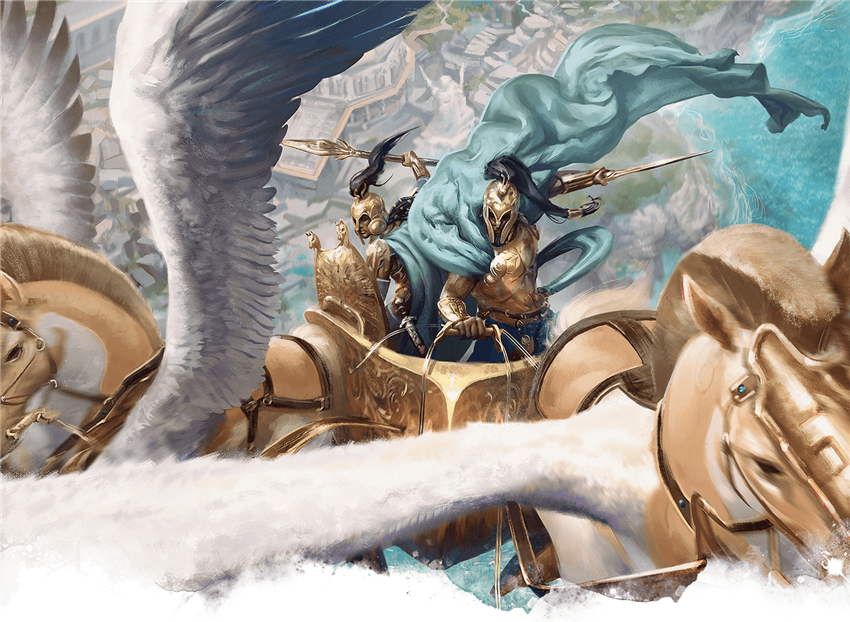
Chapter 2: Gods of Theros
Just like the gods of Greek myth, the gods of Theros are active participants in the lives of mortals, and are to be feared as much as they are beloved and respected. These gods are beings of cosmic power that are as likely to be patrons of your characters as they are to be villains of your campaigns.
Fifteen gods make up the pantheon of Theros—too many to detail here, but simply hearing the number should give you an idea of how detailed you can make the web of divine politics in your campaign, should you wish. Beyond “mere” divine intervention, life in Theros is influenced by the gods’ clergy, whose oratory and philosophy can rouse the pantheistic people of the land to unified action for good or for ill.
Many Theran heroes dedicate their heroism to a single god. Many clerics are obviously dedicated to one single god, but even fighters or rogues may say a prayer to one single god that they view as their divine benefactor before an adventure. Devout characters may start tracking their Piety, a score first suggested in the Renown section of the Dungeon Master’s Guide, but fully developed into a new form of character advancement in Mythic Odysseys of Theros.
The gods of Theros are detailed in full in this chapter, but this concise list gives a little taste of the fifteen gods of the Theran pantheon. Of course, if you wished to use Mythic Odysseys of Theros to run a game set in a magical, myth-inspired version of Ancient Greece, it is simple enough to combine these gods’ descriptions with the Greek Pantheon presented in appendix B of the Player’s Handbook.
- Athreos, god of passage
- Ephara, god of the polis
- Erebos, god of the dead
- Heliod, god of the sun
- Iroas, god of victory
- Karametra, god of harvests
- Keranos, god of storms
- Klothys, god of destiny
- Kruphix, god of horizons
- Mogis, god of slaughter
- Nylea, god of the hunt
- Pharika, god of affliction
- Phenax, god of deception
- Purphoros, god of the forge
- Thassa, god of the sea
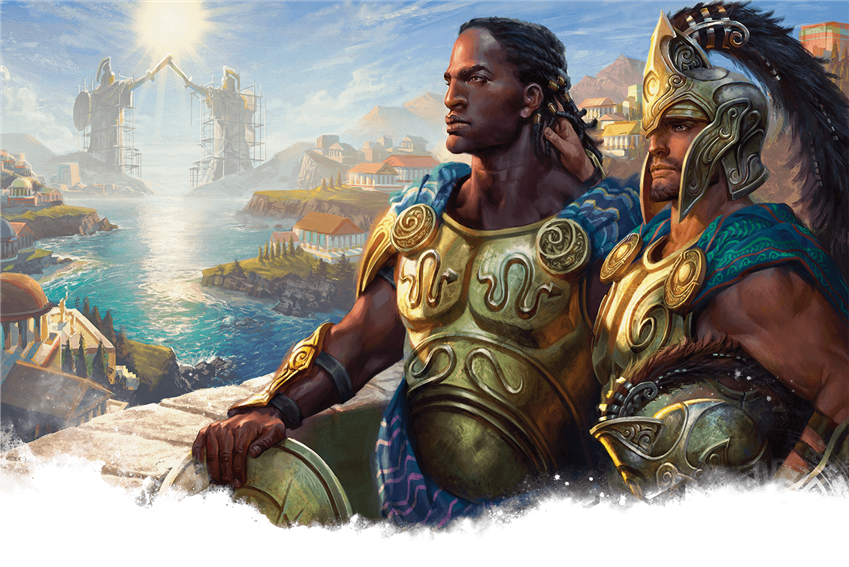
Chapter 3: Realms of Gods and Mortals
This chapter describes the brass tacks of any campaign setting: the cities and geography of the world! Like any good gazetteer, this chapter describes Theros and its three core poleis in enough detail for you run your own campaign in—but not such excruciating detail that you feel confined by what’s been written.
The three poleis of Akros (a warrior city-state with clear Spartan influence), Meletis (a city-state of philosophers and warriors with an undeniable Athenian influence), and Setessa (a polis that lives in harmony with nature) make up the majority of Theran civilization, and this chapter expounds on the similarities and differences between the three. This level of detail makes it easy to involve the heroes in faction politics, allowing these mortal conflicts to provide a change of pace from the mythic battles that they’re sure to get involved with.
Beyond these three poleis, this chapter also describes the wilderness of Theros which teems with monsters. But don’t be fooled; just because this wilderness isn’t “civilized” by the standards of the poleis doesn’t mean it’s without people and cultures worthy of your characters’ respect. Countless humanoid settlements exist beyond the poleis, and people like minotaurs, satyrs, centaurs, and the lion-like leonine may be allies or enemies on your adventures.
Divine realms are also described here, for your adventures may take you from the firm earth of Theros to the stars of Nyx, the uncharted seas at the edge of the world, or even into the Underworld itself.
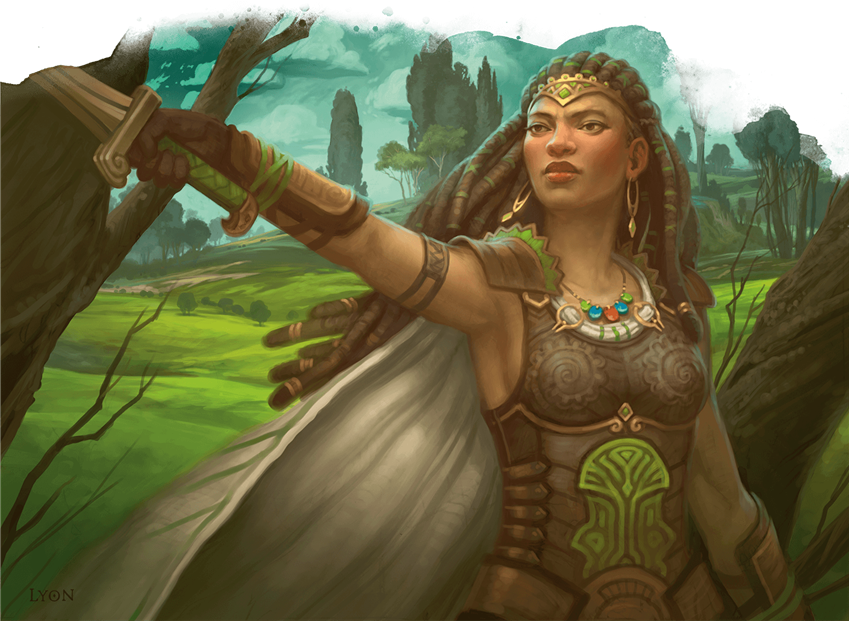
Chapter 4: Creating Theros Adventures
When you’re the Dungeon Master, it can be hard distilling so much valuable setting information into a single session of D&D. This chapter is here to help, giving you advice on how every single one of the gods could be a patron or an enemy of your players’ heroes, with quests, monsters, and adventure locations to help you make your own unique adventures. Specific guidance is even given on nautical or Underworld adventures, for those special times that your characters leave the trustworthy soil of Theros to venture into the unknown.
Also, this chapter contains a one-shot adventure called “No Silent Secret,” just in case you need something to jump-start your campaign.
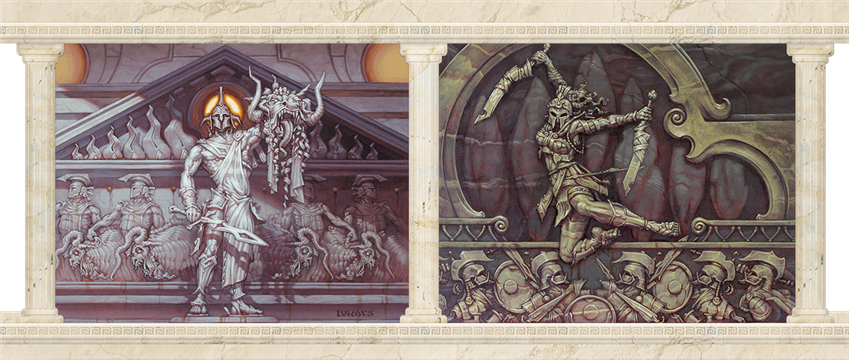
Chapter 5: Treasures
No D&D book would be complete without treasure, and no Greek myth-inspired story would be complete without magical artifacts! There are eight new magic items in Mythic Odysseys of Theros, ranging in power from the ricocheting two-birds sling to the legendary Pyxis of Pandemonium.
But of course, there’s more than eight paltry items in this book. They just happen to be more marvelous than even legendary items. Five new artifacts are provided in this chapter as well, giving your heroes the power to wield weapons of the Theran gods themselves, like Dekella, Bident of Thassa, or Ephixis, Bow of Nylea. These artifacts are powerful weapons to be sure, but they are also tools that hold power over nature itself, and increase in power when wielded by devoted champions of the god that gifted it.
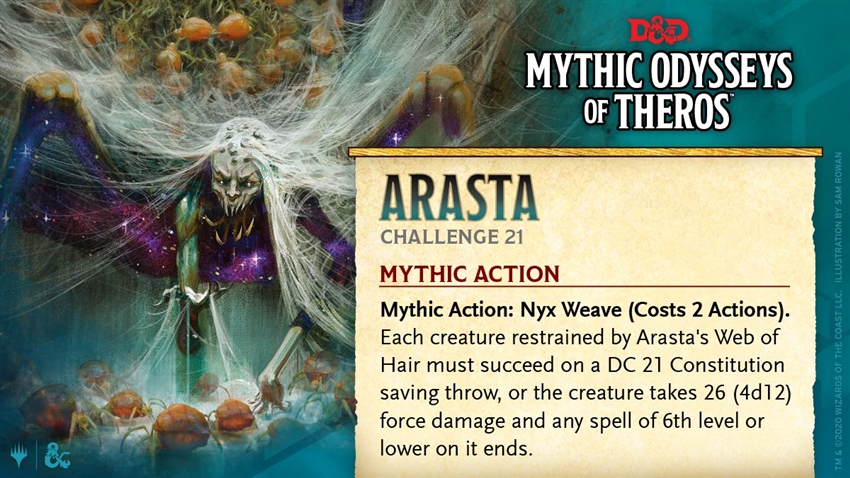
Chapter 6: Friends and Foes
The final chapter of Mythic Odysseys of Theros is a magnificent one, brimming with new monsters to endanger your players as they explore the lands of Theros. Many are brand-new creations, like the Phylaskia, guardians of the Underworld, or the anvilwrought creations of the forge god Purphoros. Others have appeared in D&D before, but come with new Theran incarnations to vex veteran players, like Nyxborn beasts, customizable Theran chimeras, the frightful ironscale hydra, new and fearsome harpies, and more.
Dungeon Masters looking for something more will be thrilled to discover Mythic Monsters that will challenge even the mightiest of adventurers. Three examples are provided in this chapter, the tragic spider-mother Arasta, the cruel master of gorgons Hythonia, and the dread kraken Tromokratis. Once these monsters are reduced to 0 hit points, they activate their Mythic Trait, granting them refreshed hit points, new powers, and access to fearsome Mythic Actions—new Legendary Actions that they can only use in their second, mythic phase. These Mythic Monsters promise dynamic battles that will push players to their limits.
James Haeck is the lead writer for D&D Beyond, the co-author of Waterdeep: Dragon Heist, Baldur's Gate: Descent into Avernus, and the Critical Role Explorer's Guide to Wildemount, a member of the Guild Adepts, and a freelance writer for Wizards of the Coast, the D&D Adventurers League, and other RPG companies. He lives in Seattle, Washington with his fiancée Hannah and their animal companions Mei and Marzipan. You can find him wasting time on Twitter at @jamesjhaeck.








-
View User Profile
-
Send Message
Posted Jun 12, 2020I want this now! Great timing, as one of my friends just started a greek inspired campaign (it has pirates, so the runterra source has been helpful too). A bit dissapointing that the gods are CR 20-probably under 30. A drow matron mother is just 1 CR weaker than a spider mother demon goddess thingy.
PS am I the only one inspired to use the Arasta statblock as Lolth and make a 5e adaption of the demonweb pits?
PPS First post! :)
-
View User Profile
-
Send Message
Posted Jun 12, 2020Please allow these features to be used for free! I am DMing during COVID-19 and this would be a great feature to use to enhance campaigns while everyone is staying apart.
-
View User Profile
-
Send Message
Posted Jun 12, 2020In fifth edition D&D, there are no stat blocks for the gods. This tradition continues with the gods of Theros, whose powers are utterly beyond mortal ken. (Tiamat is the sole exception to this statement, and I personally consider that CR 30 creature to represent a pseudo-divine avatar of Tiamat, as though her time in Avernus made her more akin to an archdevil than a god.)
-
View User Profile
-
Send Message
Posted Jun 12, 2020I preordered this, and it is nearly as juicy as wildemount.
-
View User Profile
-
Send Message
Posted Jun 12, 2020A great book, but it would be nice if DnD beyond actually supported the features, such as the optional starting with a supernatural gift/feat
-
View User Profile
-
Send Message
Posted Jun 12, 2020I always thought the Tiamat in the book was an avatar as well. Like had she gotten out fully then you just kinda die.
-
View User Profile
-
Send Message
Posted Jun 12, 2020They're working on it, but new mechanics take a while to implement.
-
View User Profile
-
Send Message
Posted Jun 13, 2020Why have you been calling it classical mythology in previous posts about Theros but Greek mythology now?
-
View User Profile
-
Send Message
Posted Jun 15, 2020O
-
View User Profile
-
Send Message
Posted Jun 15, 2020-
View User Profile
-
Send Message
Posted Jun 15, 2020Not excited at all for all the MTG crossover. Will there be any more original D&D stuff or is everything just a cross-promotional marketing experience now?
-
View User Profile
-
Send Message
Posted Jun 15, 2020Yeah, I enjoy the crossovers as much as any others, but it was predicted by dnd beyond for 2020 that it would be all original content, having to do with planar travel and that sort of stuff, and since they did a whole lot of crossovers this year, I think they might take a break from crossovers for at least half of 2021
-
View User Profile
-
Send Message
Posted Jun 15, 2020Why couldn't we just have a Greek Mythology setting? I mean I know MTG and D&D are friends now but I'd rather have a Greek mythology setting than a setting inspired by Greek mythology...
-
View User Profile
-
Send Message
Posted Jun 15, 2020That would just be Greek Mythology, you wouldn't have to create anything
-
View User Profile
-
Send Message
Posted Jun 15, 2020Theros does for Piety what Ravnica did for Renown, and I am here for it! Much of what I do when running how deities interact with characters matches with the visitations and omens, but the tables of omens are delightfully inspiring!
-
View User Profile
-
Send Message
Posted Jun 15, 2020I keep hearing about a planar travel something, I would be excited for that!
-
View User Profile
-
Send Message
Posted Jun 15, 2020Another thing I think is possible they might do is something on Psionics, because there was quite a lot of unearthed arcana on psionics.
-
View User Profile
-
Send Message
Posted Jun 17, 2020Would like to see an adventure path in this setting.
-
View User Profile
-
Send Message
Posted Jun 17, 2020I'd love that too! While this isn't a full adventure path, you can start your Theros story with No Silent Secret, an adventure for 1st-level characters found in Mythic Odysseys of Theros. You can then follow up this adventure with Wrath of the Returned, an Encounter of the Week that continues the plot begun in No Silent Secret. Once you've played these two adventures, I think you'll have enough ideas bouncing around in your head to create your own campaign in Theros. I hope you enjoy!
-
View User Profile
-
Send Message
Posted Jun 18, 2020Check out the dmsguild. They have some great stuff!